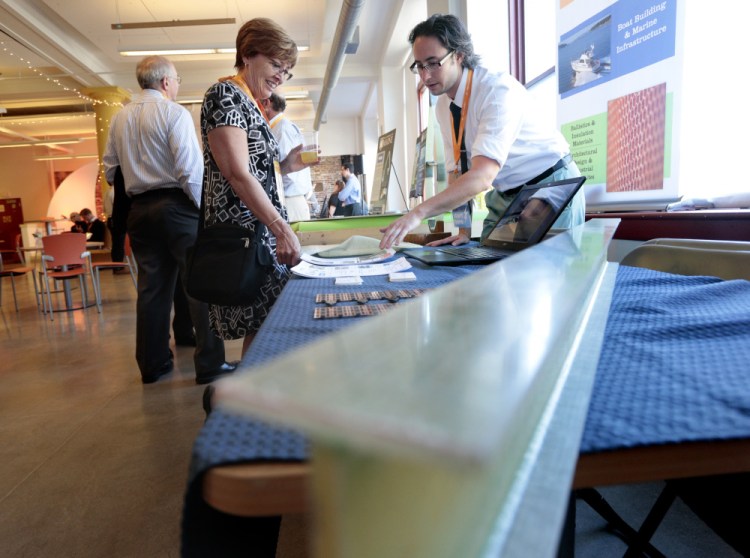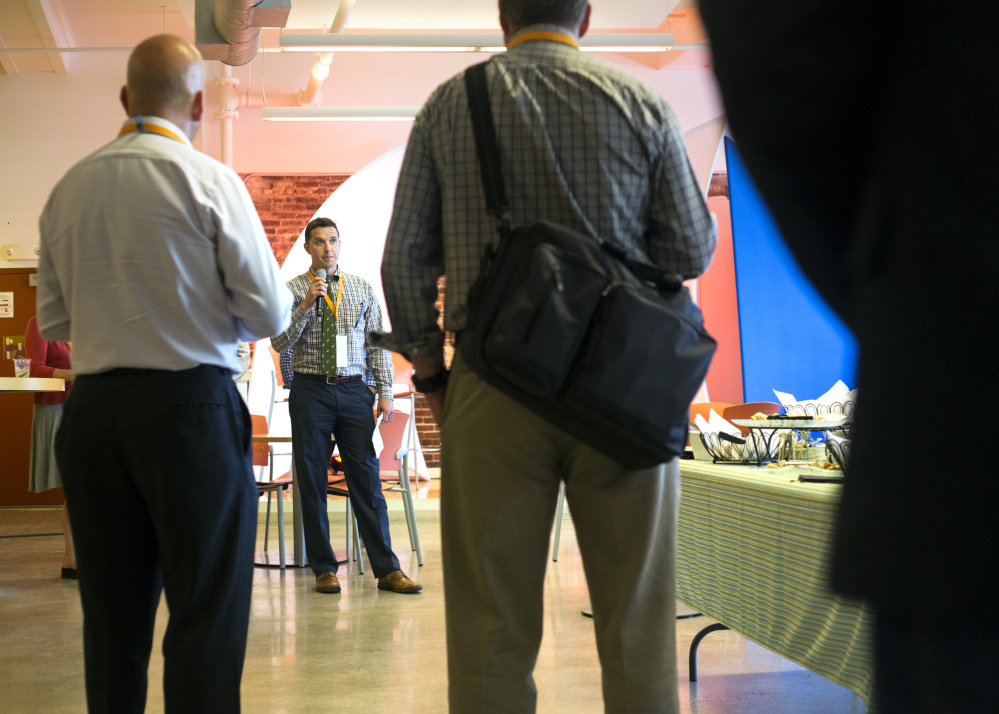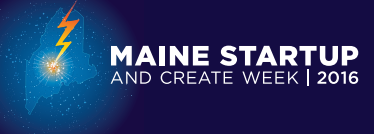Maine Startup and Create Week 2016 kicked off Monday with hundreds of entrepreneurs converging on Portland to network and learn new skills.
The weeklong event, now in its third year, attracted about 4,000 attendees in 2015, founder Jess Knox said. Each day is broken up into a series of lectures, demonstrations and workshops designed to help entrepreneurs and small businesses.
“The idea is to give participants, particularly Mainers, a space to have the opportunity to explore issues and skills related to building high-growth, high-impact (businesses),” said Knox, founder of Olympico Strategies in Portland and one of the most vocal advocates for southern Maine’s entrepreneurial community.
Much of Monday’s focus was on the importance of designing products to meet the needs and desires of customers.
“Design can seem like a costly, extraneous part of any startup,” Monday’s keynote speaker, Mimi Chun, said in an interview. “But it’s really integral, and it can be really cheap.”
Chun, a veteran artist and designer, is the design director of tech and design school General Assembly, which has 11 campuses in the U.S., England, China and Australia. She is also the creator of Stuffed Hipster Emblems, a line of soft-sculpture replicas of trendy “artisanal” foods, plants and household items made from fabric, wood and other materials. Another project of Chun’s involved sugar cookies shaped and decorated with designs lifted from iconic abstract artists.
Chun said her goal at Maine Startup and Create Week is to translate what she knows about design into a “leaner” process that small startup companies can adopt. She also hoped to pick up new information from fellow speakers and attendees.
“Learning (goes) both ways,” Chun said. “It’s pretty reciprocal in terms of the exchange.”
Some of Monday’s sessions involved hands-on activities. A morning workshop on rapid prototyping had small groups trying to design and test out new products that solved specific problems assigned by the instructors, Brooke Chornyak and Dylan Jones of Portland-based Collective IQ Design Lab.
For instance, some groups were told to create a prototype of a product that makes it possible for consumers to eat ice cream with one hand without any mess. They came up with everything from a specially designed cone with multiple “drip gutters” to an “ice cream burrito.”
“(A prototype) is a way to gain confidence in your idea,” Chornyak told the class. “It’s a way of trying something out with your users before you invest in it full time.”
First-time attendee Kate Moon, an independent editor and proofreader based in Portland, stopped for a moment on her way to another design-related session called “What do users want?” to talk about why she attended.
“I heard all about it last year, and I thought, ‘Well, I really need to go to that,’ ” Moon said.
Moon said she was curious to find out what other types of people were attending, and what sorts of things she could learn from them.
“I thought there would be a lot of good minds here, and ideas.”
Scores of speakers and panelists are scheduled to appear throughout the week, including representatives of large and small companies and institutions in Maine and across the U.S. Unum, Tom’s of Maine, CashStar, L.L. Bean, Disney, Google, Amazon and Allagash Brewing Co. are just a few of the many organizations that will be represented.
A full schedule of events, along with ticket sales and other information, is available at mainestartupandcreateweek.com.
A day pass to the event is $150, excluding lunch, and a week pass is $400. Most sessions are being held at the Maine College of Art at 522 Congress St.
There will be related events known as affiliate events in the mornings and evenings, including the Maine Technology Institute Tech Walk on Wednesday evening at The Westin Portland Harborview hotel at 157 High St., and the Maine Startup and Create Week Food Show on Thursday evening at the Portland Co. marine complex at 58 Fore St. Affiliate events require separate registration, which also can be accessed through the event’s main website.
Attendee Erik Peterson said it was his second year in a row attending the event. Peterson, co-founder of a small machine-learning and data science firm in Maine called Coria, said he sees Maine Startup and Create Week primarily as a networking opportunity, but with the added bonus of being educational.
“The sessions are generally very interesting and valuable,” Peterson said.
Not every session Monday was about product design. The evening’s activities included a kick-off event for Work in Place, a Portland-based nonprofit organization devoted to issues faced by remote workers, a growing segment of the workforce in Maine and throughout the world.
Adding a helping of “gee whiz” to Monday’s program was a panel discussion on the future of the space industry.
Panelist Karl Hoose, CEO and chief technology officer of Sanford-based VALT Enterprises, said he was asked to participate because his company is developing technology to make it more economical to launch small objects such as satellites into orbit. VALT develops, manufactures and markets vertical air-breathing launch technology (VALT) vehicles and launch services.
“There’s just a whole new generation of technology in satellites,” Hoose said.
J. Craig Anderson can be contacted at 791-6390 or at:
Twitter: jcraiganderson
Send questions/comments to the editors.






Comments are no longer available on this story